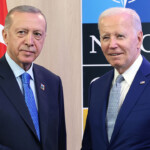‘Before a confused and/or aloof set of allies, President Erdoğan continues unhindered on his path to subordinate the entire judiciary to the executive branch. Two developments on July 25 may go down to history as new major steps in that direction.’
On July 25, the stage was the large congress hall at the Presidential Palace in Ankara and the scene was truly striking. The occasion was the “drawing of the lots” for placements for the newly recruited judges and prosecutors of the Republic. There were more than a thousand of them in the hall, dressed in regular robes, waiting for President Erdoğan to enter.
Under any normal circumstances, such a ceremony would be a humble, routine, ordinary affair. But, as on many occasions in the past decade, for Erdoğan it was an occasion to show force—and to test the loyalties of the judiciary.
Not unexpectedly, all the attendees stood up as Erdoğan marched onto the stage, their eyes admiringly fixed on the leader. Then, the President took the floor for an extended speech, in which he delivered a “tour d’horizon” of how he had been targeted by dark forces: the Gezi park protests, the major graft probes in late 2013, and the attempted coup in 2016. Several times, his speech was interrupted by loud applause by the judges and prosecutors. Most remarkably, he touched on the subject of politics— fiercely attacking his opponent, opposition leader Kemal Kılıçdaroğlu. When he claimed that “Kılıçdaroğlu was drinking tea in an Istanbul suburb on the night of the coup attempt,” he received a standing ovation.
The entire scene that day at the Presidential Palace is yet another confirmation of how far Erdoğan has gone to engineer the judiciary in Turkey, and to protect his rule—and how near he has come to the tyrannical systems of any Central Asian state. The day after, only a handful of critics could take up the subject (the rest having been cowed into silence) in order to underline the near-complete erosion of the central tenet of any democratic republic. There was almost no reaction from the political opposition. Such ceremonies have become “normalized” for the amusement of the President.
The same day, we also saw the capture of the judiciary properly tested. The target was a small group of Kurdish and Turkish journalists covering the judiciary and the ongoing trials against their colleagues.
On July 25, the Turkish police detained Fırat Can Arslan, a reporter for the pro-Kurdish Mezopotamya News Agency. Arslan was detained at his house in Ankara in relation to an investigation by the chief prosecutor’s office in Diyarbakır over allegations that the journalist was “making targets of those who were tasked to combat terrorism,” according to multiple news reports.
As reported by the Committee to Protect Journalists (CPJ), “the investigation concerns a tweet Arslan posted on July 18 about the reassignments of a judge and prosecutor who are married to each other and are involved in an ongoing mass trial of journalists in Diyarbakır.”
It didn’t end with his arrest. Four other journalists in different cities were also detained for retweeting Arslan’s post: Mezopotamya reporter Delal Akyüz in the western city of Izmir, literature website K24 editor Sibel Yükler in Ankara, news website Bianet editor Evrim Kepenek in Istanbul, and freelance journalist Evrim Deniz in Diyarbakır. All were released on Tuesday after questioning and remain under judicial control with a foreign travel ban according to news reports.
These journalists are accused of “targeting individuals who have taken part in the fight against terrorism,” because they posted about a marital relationship between the prosecutor and judge of an ongoing trial against 18 journalists. The authorities seem keen to invoke clause 6 of the Anti-Terror Law, a vaguely formulated paragraph which criminalizes reporting on public servants, with the pretext that “they can therefore be targeted by terror organizations.”
But what makes these arrests a new development is that up until July 25, such accusations only led to prosecutions, without arrests. In this particular case, the “crime” was that these journalists tweeted and retweeted an open source, namely a journal of the website of the judiciary. A new phase is likely opening, in which the judiciary will interpret the Anti-Terror Law even more widely in order to further block reporting.
“What is happening is the absolute protection of the government’s media strategy by the judiciary: All possible gaps will be filled by reversing the articles of the law and turning the rules of investigation upside down” said Ali Topuz, Editor of the Arti Gercek news site. “Thus, the flow of information will be completely destroyed.”
Gökçer Tahincioğlu, a reporter covering the judiciary and trials, wrote:
“From this point of view, no public official’s name can be mentioned in any news report in Turkey. No matter what he/she has done…Such an absurd and important investigation in terms of freedom of the press and freedom of expression did not find a place on the opposition’s agenda on Tuesday. Journalists were alone in the courthouse; they did not even receive symbolic support.”
So we enter a new phase. While Turkey’s allies are still mumbling that “Turkey is a democracy” and engaging in the rhetoric of appeasement, President Erdoğan continues to devour the remnants of the judiciary.
As the rest of the world continues to turn a blind eye, there are only a few steps left. Three of the high judges in Turkey’s Constitutional Court will be replaced consecutively within 10 months. Currently, the “balances” in the 15 seat Court is 8 to 7. Three judges leaving are those appointed by the former President Abdullah Gül—and they represent the “moderate” flank. Muammer Topal will leave on January 29, 2024; Court Chairman Zühtü Arslan on April 17, 2024 and Emin Kuz, on May 12, 2024.
All new appointments will be chosen by Erdoğan. Then, by the summer of 2024, we will have a Constitutional Court where the “balance” will be 3-12 in favor of the current political executive.
So, yes, Turkey is turning. But not, as some rosy commentaries claim, toward the West, but towards the depths of Central Asia.
The views and opinions expressed above are the author’s and do not reflect those of the Free Turkish Press.


